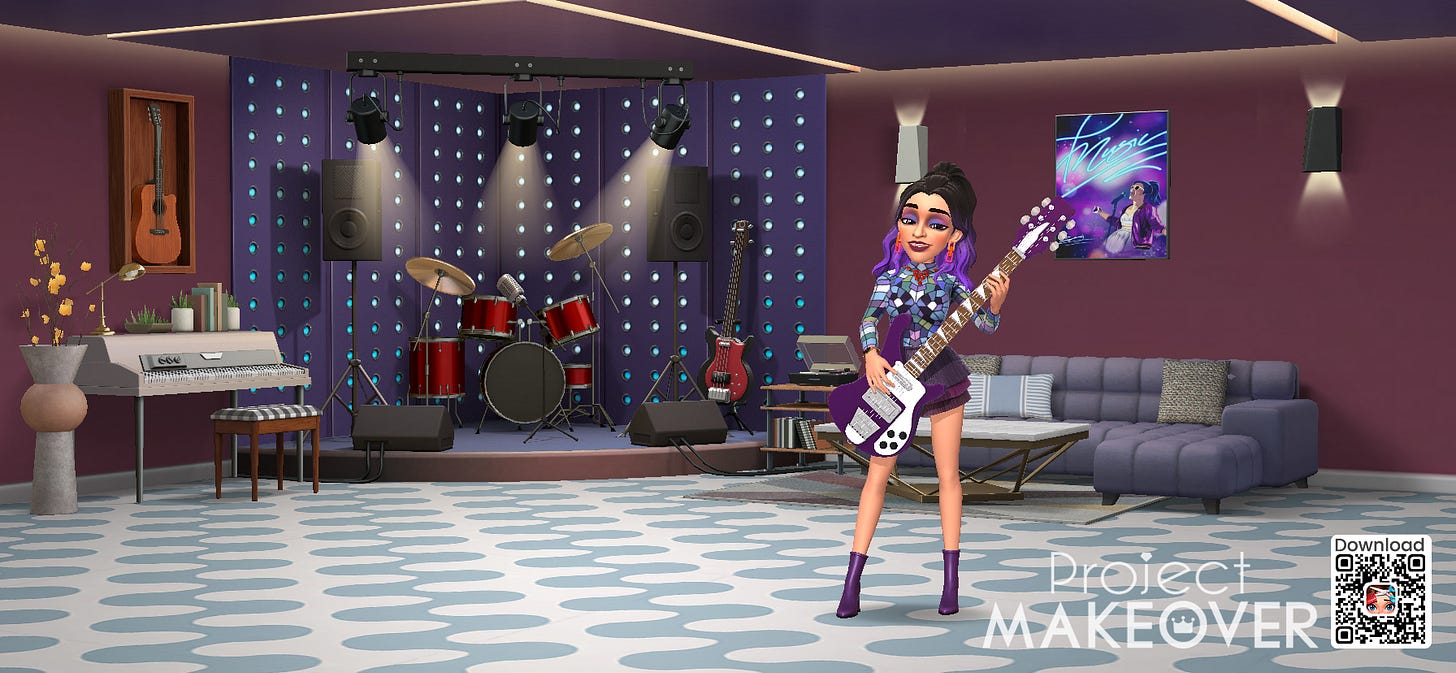When my mother first showed me the smartphone game Project Makeover, I thought it was really shallow. As she explained it, the idea was to transform characters who initially look messy and dirty into better versions of themselves, giving a makeover to both their appearance and their living spaces. In order to do so, you have to play a match-3 game similar to Candy Crush in order to earn coins to spend on items for the makeover.
I didn’t know why looking “messy” was necessarily a bad thing, so initially I kept away from the game. But then my mother had me style some of the characters, and I got hooked. Using your coins, you purchase haircuts, makeup, clothes, furniture, and other items for the current makeover character. For each item — say, a jacket, or a sofa — you are given three options to choose from. Winning levels can also unlock for you bonus items — usually decor or accessories — for your characters.
I find it so fun to coordinate colors and styles for each of the characters. Even though there’s a finite number of combinations, it feels like I’m creating something of my own. My favorite character so far has been the musician — not just because I’m a musician myself, but because the color coordination for that character worked splendidly to express the rockstar that she was.

The narratives associated with the characters, however, have much to critique. Several of the characters seem neurodivergent to me: the horror movie fanatic who makes her passion her whole personality, the 80s lover who is attached to the aesthetics of her childhood, the botanist who is so disorganized that his plants literally have grown into the walls of his office.
Personally, I don’t think there’s inherently a problem with expressing your love of horror movies or a particular decade through dress and decor. If it causes you to have an unfulfilling life in other ways, such as not having the relationships you desire, then you may want to make adjustments to your life, but only to attain your personal goals, not anyone else’s. On the other hand, severe disorganization probably does pose a problem for people…but the game makes it comically exaggerated.
The issue with the game is that it makes it seem like neurodivergent people can suddenly become more neurotypical just with a change of appearances. Actually, that’s a problem with the more neurotypical characters, too — the whole premise is that a makeover of your looks and living spaces can change everything in your life, including your productivity, stress level, and relationships. The horror movie fanatic suddenly is able to go on a date with somebody to the movie theater, and the botanist suddenly has an extensive organizational system that makes him more productive.
Of course, the nature of the game is fantasy, even if it refers to real life. It imitates reality shows like Queer Eye in which the hosts give people style advice and facilitate a makeover of their lives. The game goes even further than this, sometimes even completely rebuilding a character’s house that has been destroyed by a storm. So of course the makeovers will be dramatic. They still shouldn’t uproot someone’s neurodivergence.
Another critique I have of the game is that all the characters have conventionally good-looking bodies. None of the characters so far are fat — indeed, the women tend to be quite skinny and curvy at once, unless they are older, in which case they’re just slightly less skinny — and all of the men, even the nerdy botanist, are ripped. The game rigidly conforms to gender norms, giving all of the women and never the men makeup and purses and restricting the color palettes for men’s clothing.
I did find a hack in the game where I can make my personal avatar switch genders at any time, such that I basically have two avatars to use. This has been delightful, because I initially picked a male avatar but then discovered that his clothing choices are severely limited in styles and colors. This is a fashion game — don’t men who play this game like style, too?


If I have so many critiques of this game, why do I continue playing it? Partly because when I was really manic last month, before I went to the hospital, I found that the game was one of the few things that kept me occupied and reduced my restlessness and recklessness, so I hyperfixated on it in order to keep myself safe. But now that I’m in a mixed episode and feeling more despair, I think there is some part of me that wishes that I could have a makeover for my own life. And my guess is that many other people who play the game have a similar secret desire.
For me, playing into the fantasy of Project Makeover has unearthed for me this angst I have for how my life will play out. I am a neurodivergent person who sometimes wishes that something could magically eliminate the difficulties I experience. But I know that some things will always stay with me, and I will just have to accommodate them, cope with them, befriend them.
When I become more stable, hopefully in the next few months, I will have a choice of how to restart my life. Do I want to return to what I was already doing at the beginning of last fall, or do I want to do something different? Either way, I will have opportunities to change my approach to life and hopefully to take care of myself better, both mentally and physically.
And maybe I can update my style, too. Just for myself, my own joy.


